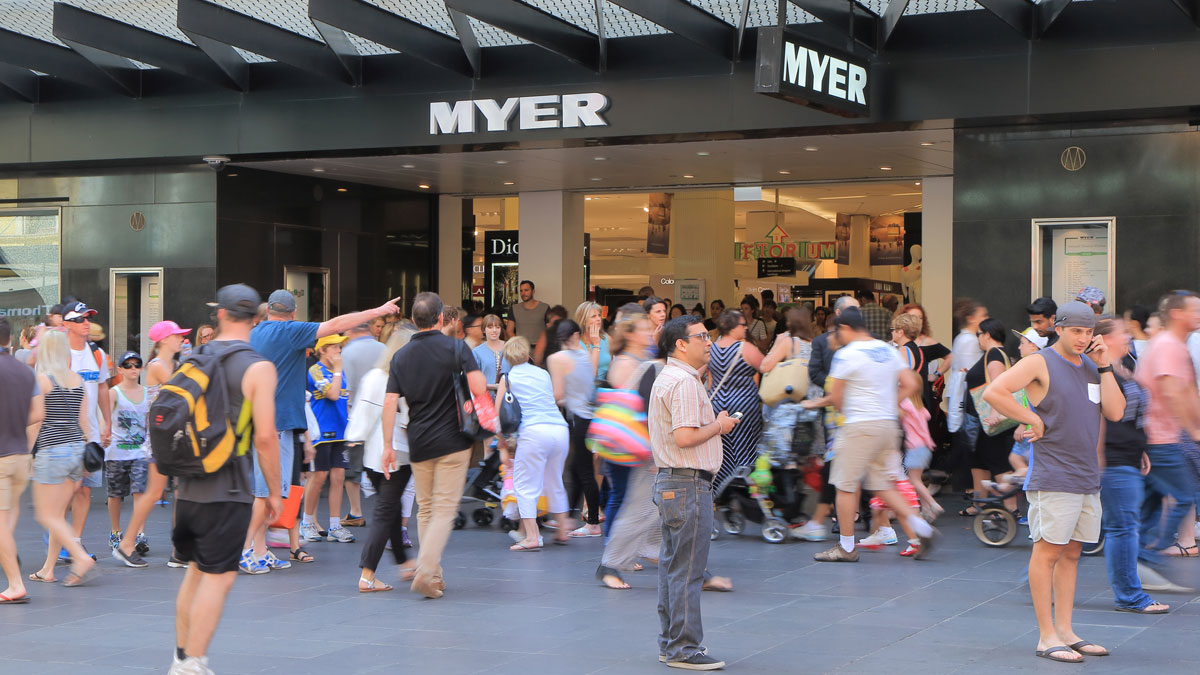CRITERION: There’s nothing discrete about this post-lockdown shopping spree

Picture: Getty Images
If the Reserve Bank board really wants to break the spirit of Australian shoppers, it’s going to have to try harder: consumers are digging in like a tennis champ deep into a five-setter, deftly returning the central bank’s volley of rate rises.
Leading into the earnings season, a slew of ASX discretionary retailers has reported sales numbers that largely defy a downturn and lingering supply chain disruptions.
The sector’s comeback kid in the style of Andy Murray or Victoria Azarenka, this week Myer Holdings (ASX:MYR) showed why the storied chain has been in the sights of major shareholder Solomon Lew: total sales for the five months to December were almost 25 per cent higher – and the best in almost a decade.
Sales were also 14 per cent higher than the relevant pre-pandemic period in 2019 – and the growth is profitable as well.
If anything, the retail resilience is being driven by old-fashioned physical stores, even though there’s fewer of them in the case of Myer.
Conversely, the online-only Kogan (ASX:KGN) reports a “subdued” 33 per cent sales decline to $471 million, albeit cycling the strong lock-down period.
The owner of Supercheap Auto, BCF, Rebel and Macpac chains, Super Retail Group (ASX:SUL) served up an update of an 11 per cent sales increase for the half on a like for like basis, to $1.96 billion.
As CEO Anthony Heraghty says of the “outstanding” numbers, consumers are “living a little’ after two to three years of Covid hermitdom.
Exceeding investor expectations, JB Hi Fi (ASX:JBH) smashed it with unaudited sales of $5.278 billion, up 8.6 per cent and a record half year profit of $330 million.
Of course there’s a ‘needs’ rather than ‘wants’ element to JB’s sales, given demand for home office essentials such as laptops and chargers.
The same can’t be said for jeweller Michael Hill International (ASX:MHJ), which attributes a 12 per cent sales increment (to $363 million) on pent-up demand for its dazzling stones and trinkets.
There’s always a spoil-sport and in the case of retail it’s the specialist infant chain Baby Bunting (ASX:BBN), which expects flat comparative sales and an expected 59 per cent profit decline.
CEO Matt Spencer cites a “degree of consumer uncertainty”, rather than any post-lockdown slowdown in baby-making activity. But one has to wonder …
It remains to be seen whether retail spending will continue to return serve, or be aced by the RBA’s further hikes rates aimed to quell inflation which remained disturbingly high in the December quarter.
Bear in mind the central bank is deliberately aiming to slow the economy – and consumer spending.
So, the rate rises will keep coming until consumers finally do lob one into the net. But it’s a circular argument because when retail sales (and inflation) do abate, that’s likely to pause further rate rises to the benefit of … the retail sector.
Strokes beard…
Despite being one of the nation’s least enthusiastic shoppers, your columnist likes the look of many of the smaller ASX retailers after recent share retractions. Many trade on earnings multiples of less than 10 times and yield 5 per cent or more.
We’ve mentioned smelly candle purveyor Dusk Group (ASX:DSK) and the well-manicured Shaver Shop (ASX:SSG) in recent dispatches.
While Baby Bunting shares have fallen more than 50 per over the last 12 months, the well-run chain is far from a cot case.
Another one to watch is the battling plus-sized clothier City Chic Collective (ASX:CCX), given retail value-sniffer Brett Blundy has emerged with a 7 per cent stake.
Speaking of which, we’ve long had our eye on large cap-turned-minnow Myer, if only because we wouldn’t dare question Solly Lew’s retail smarts.
This story does not constitute financial product advice. You should consider obtaining independent advice before making any financial decisions.
UNLOCK INSIGHTS
Discover the untold stories of emerging ASX stocks.
Daily news and expert analysis, it's free to subscribe.
By proceeding, you confirm you understand that we handle personal information in accordance with our Privacy Policy.








